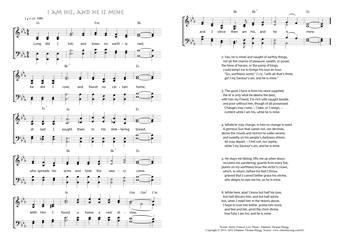Christ My Song - 62
Long did I toil, and knew no earthly rest - I am his, and he is mine
(Henry Francis Lyte/Johannes Thomas Rüegg)
I am his, and he is mine.
1. Long did I toil, and knew no earthly rest;
far did I rove, and found no certain home;
at last I sought them in his sheltering breast,
who spreads his arms and bids the weary come.
With him I found a home, a rest divine;
and I since then am his, and he is mine. PDF - Midi
2. Yes, he is mine! and naught of earthly things,
not all the charms of pleasure, wealth, or power,
the fame of heroes, or the pomp of kings,
could tempt me to forego his love an hour.
"Go, worthless world," I cry, "with all that's thine;
go! I my Saviour's am, and he is mine."
3. The good I have is from his store supplied;
the ill is only what he deems the best;
with him my Friend, I'm rich with naught beside,
and poor without him, though of all possessed.
Changes may come, – I take, or I resign, –
content while I am his, while he is mine.
4. Whate'er may change, in him no change is seen!
A glorious Sun that wanes not, nor declines,
above the clouds and storms he walks serene,
and sweetly on his people's darkness shines.
All may depart, – I fret not, nor repine,
while I my Saviour's am, and he is mine.
5. He stays me falling; lifts me up when down;
reclaims me wandering; guards from every foe;
plants on my worthless brow the victor's crown,
which, in return, before his feet I throw,
grieved that I cannot better grace his shrine,
who deigns to own me his, as he is mine.
6. While here, alas! I know but half his love,
but half discern him, and but half adore;
but, when I meet him in the realms above,
I hope to love him better, praise him more,
and feel and tell, amid the choir divine,
how fully I am his, and he is mine.
Henry Francis Lyte, in: Philip Schaff: Christ in Song, 1870, 402-403.

